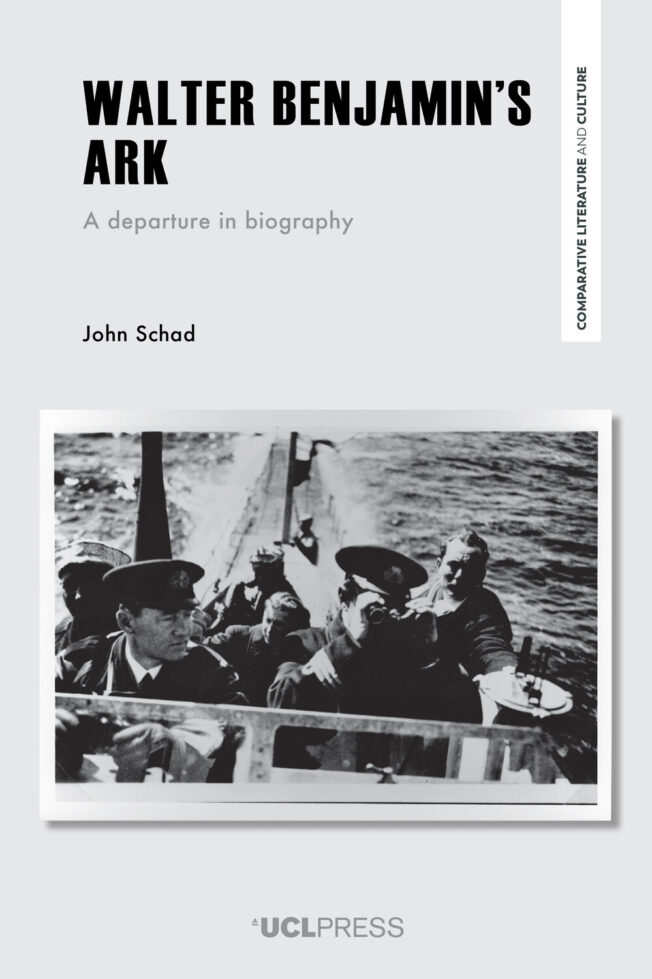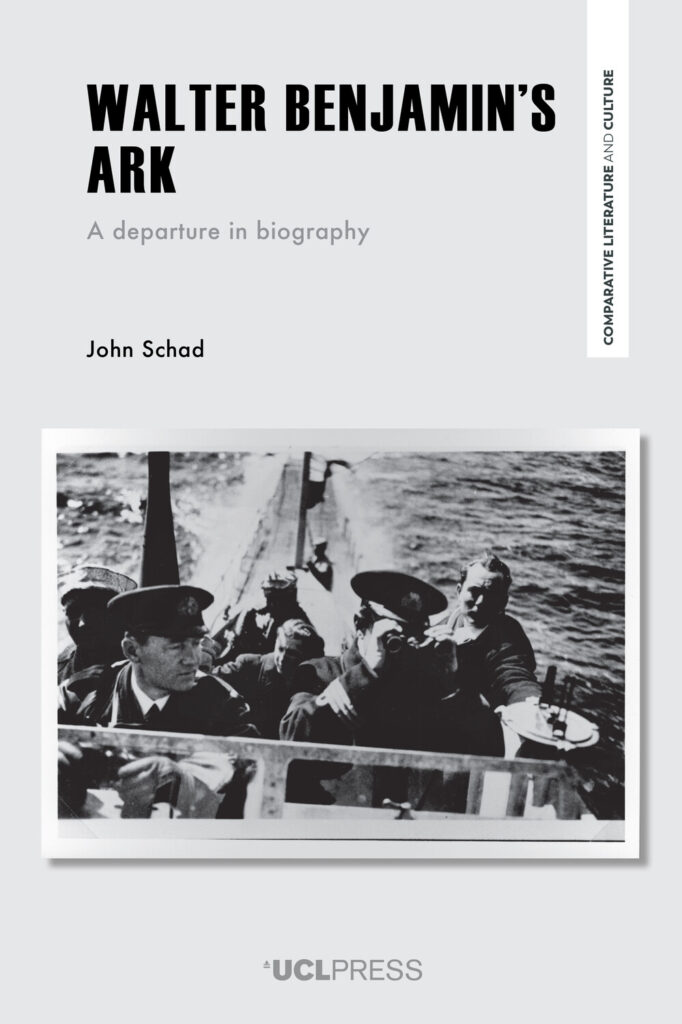
Walter Benjamin’s Ark
A departure in biography
John Schad (Author)
In July 1940, amidst fear of Nazi invasion, HMT Dunera left England. On board were a few British soldiers guarding over 2000 interned male Enemy Aliens, mostly Germans. Some of the internees were passionate Nazis, but most were Jewish refugees. Among them was Stefan Raphael Benjamin, the estranged child of the German-Jewish intellectual, Walter Benjamin.
Cue Walter Benjamin’s Ark which re-reads the life and work of Walter Benjamin via the curious life of his only child. The focal point is Stefan’s dramatic voyage from England to Australia in 1940, a voyage rich in intellectual suggestion, shared as it was with obscure men with famous names such as Wittgenstein, Kafka, Marx and Wilde. Central to the book is the one substantive text that can be ascribed to Stefan: Benjamin’s meticulous transcription of Stefan’s utterances as an infant. This fascinating text has been largely overlooked, despite the insistence of Benjamin’s biographers that ‘it continued to play a role in Walter Benjamin’s writing until the end of his life’. This book thus seeks not only to bring into view the intriguing figure that is Stefan but also to identify him as that most crucial of Benjaminian spectres, namely, the secret ‘you’ or addressee of Benjamin’s writings.
List of figures
List of abbreviations
Preface
Acknowledgements
Introduction
1 (Unknown)
2 (Unseen)
3 (Unless)
4 (Untold)
5 (Untoward)
Postface
Afterword by Mona Benjamin
Bibliography
Index
DOI: 10.14324/111.9781800089709
Publication date: 03 November 2025
PDF ISBN: 9781800089709
EPUB ISBN: 9781800089716
Hardback ISBN: 9781800089679
Paperback ISBN: 9781800089693
John Schad (Author) 
John Schad is Professor of Modern Literature at the University of Lancaster and author of several works of experimental criticism, including *Someone Called Derrida* (Sussex, 2007), The Late *Walter Benjamin* (2012), *Paris Bride* (2020) and (with Fred Dalmasso) *Derrida | Benjamin. Two Plays for the Stage* (2021).
‘Walter Benjamin’s Ark is the story of a imaginary voyage spun out of a real one, of the ship Dunera that that carried Walter Benjamin’s son Stefan from Britain to Australia. The voyage is a compound of many other voyages, on different fictional and historical wavelengths, its passengers a collection of stowaways. stand-ins, impostors, understudies, namesakes and doppelgängers, including a Wittgenstein, a Kafka and a trio of Wildes. By turns séance, vaudeville routine and somnabulistic seminar, and constantly invaded by refugee voices from the written words of Benjamin and others, this is a haunting, haunted voyage through a dream history of the Second World War. Once more, John Schad has come up with a wholly new, and utterly unforgettable way of writing history.’
Steven Connor, King’s College London
Hosts, Hospitals and Hospitalities
Susana Araújo, Catarina Nunes de Almeida, Santiago Pérez Isasi,
01 July 2026
Creative Critical Interventions for Social Justice
Natasha Tanna, Abeyamí Ortega Domínguez, Hakan Sandal-Wilson,
04 February 2026
Translation Studies before ‘Translation Studies’
Kathryn Batchelor, Iryna Odrekhivska,
15 January 2026
Contemporary Afro-Brazilian Short Fiction
Ana Cláudia Suriani da Silva, Julio Ludemir, Maria Aparecida Andrade Salgueiro,
03 September 2024
Gabriel Harvey and the History of Reading
Anthony Grafton, Nicholas Popper, William H. Sherman,
08 January 2024
The Bankruptcy
Júlia Lopes de Almeida, Ana Cláudia Suriani da Silva, Cintia Kozonoi Vezzani, Jason Rhys Parry,
17 July 2023
Drama, Poetry and Music in Late-Renaissance Italy
Virginia Cox, Lisa Sampson, Anna Wainwright,
08 June 2023
Walter Benjamin’s Ark
A departure in biography
In July 1940, amidst fear of Nazi invasion, HMT Dunera left England. On board were a few British soldiers guarding over 2000 interned male Enemy Aliens, mostly Germans. Some of the internees were passionate Nazis, but most were Jewish refugees. Among them was Stefan Raphael Benjamin, the estranged child of the German-Jewish intellectual, Walter Benjamin.
Cue Walter Benjamin’s Ark which re-reads the life and work of Walter Benjamin via the curious life of his only child. The focal point is Stefan’s dramatic voyage from England to Australia in 1940, a voyage rich in intellectual suggestion, shared as it was with obscure men with famous names such as Wittgenstein, Kafka, Marx and Wilde. Central to the book is the one substantive text that can be ascribed to Stefan: Benjamin’s meticulous transcription of Stefan’s utterances as an infant. This fascinating text has been largely overlooked, despite the insistence of Benjamin’s biographers that ‘it continued to play a role in Walter Benjamin’s writing until the end of his life’. This book thus seeks not only to bring into view the intriguing figure that is Stefan but also to identify him as that most crucial of Benjaminian spectres, namely, the secret ‘you’ or addressee of Benjamin’s writings.
‘Walter Benjamin’s Ark is the story of a imaginary voyage spun out of a real one, of the ship Dunera that that carried Walter Benjamin’s son Stefan from Britain to Australia. The voyage is a compound of many other voyages, on different fictional and historical wavelengths, its passengers a collection of stowaways. stand-ins, impostors, understudies, namesakes and doppelgängers, including a Wittgenstein, a Kafka and a trio of Wildes. By turns séance, vaudeville routine and somnabulistic seminar, and constantly invaded by refugee voices from the written words of Benjamin and others, this is a haunting, haunted voyage through a dream history of the Second World War. Once more, John Schad has come up with a wholly new, and utterly unforgettable way of writing history.’
Steven Connor, King’s College London

